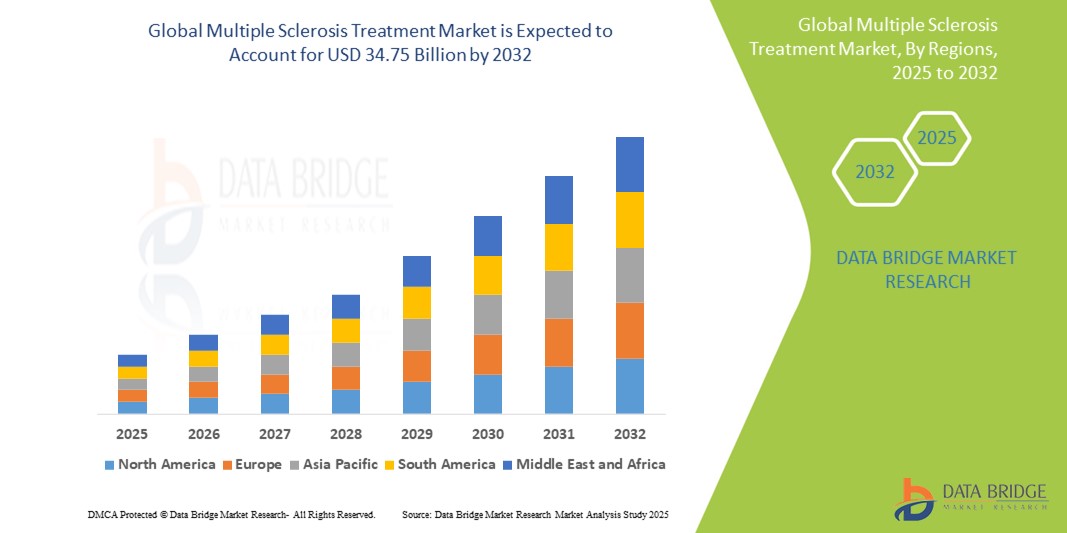Global Multiple Sclerosis Treatment Market
市场规模(十亿美元)
CAGR :
% 
 USD
26.80 Billion
USD
34.75 Billion
2024
2032
USD
26.80 Billion
USD
34.75 Billion
2024
2032
| 2025 –2032 | |
| USD 26.80 Billion | |
| USD 34.75 Billion | |
|
|
|
|
全球多發性硬化症治療市場細分,按類型(臨床孤立症候群 (CIS)、復發緩解型 MS (RRMS)、原發性進展型 MS (PPMS) 和繼發性進展型 MS (SPMS))、治療(藥物、幹細胞療法、物理治療、血漿置換等)、藥物類別(免疫調節劑、免疫抑制劑、幹擾素影像(MRI)、簡單電刺激測試、腰椎穿刺等)、給藥途徑(口服、腸外等)、最終用戶(醫院、專科診所、家庭護理等)、分銷渠道(醫院藥房、零售藥房、網上藥房等) - 行業趨勢和預測到 2032 年
多發性硬化症治療市場規模
- 2024 年全球多發性硬化症治療市場規模為268 億美元 ,預計 到 2032 年將達到 347.5 億美元,預測期內 複合年增長率為 3.30%。
- 多發性硬化症治療市場的成長很大程度上是由全球多發性硬化症盛行率的上升所推動的,這導致對有效治療疾病和改善患者生活品質的療法的需求不斷增加
- 此外,生物技術和藥物研究的不斷進步,不斷推出新的疾病改良療法 (DMT) 和口服藥物,從而提高治療效果並提供更便捷的給藥
多發性硬化症治療市場分析
- 多發性硬化症 (MS) 治療包括疾病改良療法、症狀管理和康復,對於患有這種自體免疫疾病的患者來說,在現代醫療保健中越來越重要。它致力於透過藥物和綜合護理策略的進步來減少疾病活動、減緩疾病進展、控制衰弱症狀並改善整體生活質量
- 多發性硬化症治療市場正在經歷顯著擴張,主要原因是全球多發性硬化症盛行率的上升。患者數量的增加刺激了對有效療法的需求,以控制疾病並改善患者的生活質量
- 北美在多發性硬化症治療市場佔據主導地位,2024 年其收入份額最大,為 38.8%,這歸功於其先進的醫療基礎設施、先進醫療設備的高採用率以及領先的製藥和醫療設備製造商的強大影響力
- 由於醫療保健支出不斷增加、老齡人口日益增多且易患慢性病,以及快速發展的醫療保健體系對多發性硬化症及其治療的認識不斷提高,預計亞太地區將成為預測期內多發性硬化症治療市場增長最快的地區
- 藥物在多發性硬化症治療市場中佔據主導地位,2024 年的市場份額為 81.3%,這得益於藥物在控制多發性硬化症患者的病程、降低復發率和減緩殘疾進展方面發揮的關鍵作用
報告範圍與多發性硬化症治療市場細分
|
屬性 |
多發性硬化症治療關鍵市場洞察 |
|
涵蓋的領域 |
|
|
覆蓋國家 |
北美洲
歐洲
亞太
中東和非洲
南美洲
|
|
主要市場參與者 |
|
|
市場機會 |
|
|
加值資料資訊集 |
除了對市場價值、成長率、細分、地理覆蓋範圍和主要參與者等市場情景的洞察之外,Data Bridge Market Research 策劃的市場報告還包括深入的專家分析、定價分析、品牌份額分析、消費者調查、人口統計分析、供應鏈分析、價值鏈分析、原材料/消耗品概述、供應商選擇標準、PESTLE 分析、波特分析和監管框架。 |
多發性硬化症治療市場趨勢
“透過人工智慧和智慧整合提高多發性硬化症治療市場的精準度和用戶體驗”
- 全球多發性硬化症治療市場中一個重要且快速加速的趨勢是人工智慧 (AI) 的深度融合以及旨在提升用戶體驗的智慧功能的融入。這種尖端技術的融合從根本上改變了多發性硬化症病情進展和治療依從性的管理方式,提供了前所未有的便利性和控制力
- 例如,越來越多的複雜多發性硬化症治療支援設備配備了先進的連接選項,如藍牙和 Wi-Fi。這些技術實現了無縫數據傳輸,使患者能夠追蹤他們的症狀進展、藥物依從性和副作用情況,並使醫療保健專業人員能夠遠端監控趨勢並調整治療計劃
- 多發性硬化症治療平台中的人工智慧整合可實現多種功能,例如提高 MRI 掃描病變分析的準確性、根據個別患者資料提供個人化診斷見解的潛力,以及根據全面的臨床和使用數據生成更聰明的警報
- 透過單一、直覺的介面,使用者可以管理他們的用藥計劃,接收注射或預約的個人化提醒,並與醫療保健提供者安全地共享他們的資料。這為患者和臨床醫生在管理這種複雜的神經系統疾病方面創造了統一且高度支持的體驗
- 醫院和家庭醫療保健領域對提供無縫人工智慧和語音控制整合的多發性硬化症治療解決方案的需求正在快速增長。這種激增是由於患者和臨床醫生對便利性、準確性和全面的智慧健康功能的強烈集體優先考慮
多發性硬化症治療市場動態
司機
“由於多發性硬化症患者增加以及治療方案的進步,需求不斷增長”
- 全球人口不斷增長,多發性硬化症 (MS) 的盛行率不斷上升,加上對有效、便利的治療介入措施的需求不斷增加,是多發性硬化症治療需求增加的重要驅動力。由於 MS 持續影響全球數百萬人,對這種慢性神經系統疾病進行準確診斷和及時治療管理至關重要
- 例如,主要公司在開發新型高效疾病改良療法 (DMT) 方面的不斷創新正在推動市場成長
- 此外,患者友善藥物輸送平台(特別是口服和自我注射解決方案)的日益複雜化,需要精確且易於使用的給藥方式,加上對互聯患者監測系統的需求,使得多發性硬化症治療成為現代醫療保健方案的一個組成部分。這些系統與數位健康平台無縫集成,可遠端監控症狀和藥物依從性,並共享數據以實現個人化護理
- 慢性多發性硬化症患者能夠方便地接受治療,遠端監控能力(例如,透過數位療法提高依從性),以及透過整合智慧系統管理複雜治療方案的能力,是推動醫院和家庭醫療保健領域採用多發性硬化症治療的關鍵因素。改善患者體驗的趨勢和日益普及的使用者友善治療方案進一步促進了市場的成長
克制/挑戰
“對高昂治療費用和複雜疾病管理的擔憂”
- 人們對一些先進的多發性硬化症治療療法的相對較高的成本以及複雜疾病管理的潛力的擔憂對更廣泛的市場滲透構成了重大挑戰。由於這些治療方案整合了更多功能和技術,如果沒有明確的指導、標準化的方案和適當的患者教育,它們很容易受到與患者依從性相關的問題的影響,從而引起醫護人員和患者對長期治療的可行性和可持續性的擔憂
- 例如,疾病改良療法 (DMT) 每年的費用相當高昂——平均每位患者每年超過 94,000 美元——這使得一些人在沒有強有力的報銷支持的情況下不願完全接受最先進的多發性硬化症治療方案。透過創新定價模式、擴大保險覆蓋範圍以及全行業努力標準化獲取途徑來解決這些財務負擔,對於建立患者信心和確保公平獲得可靠的治療結果至關重要
- 此外,一些先進的多發性硬化症治療系統(特別是那些結合了尖端生物製劑或個人化基因療法的系統)的初始成本相對較高,這可能會成為資源受限的醫療保健系統或沒有足夠保險覆蓋的患者採用這些系統的障礙。雖然更基本的通用治療可能更實惠,但高效輸液或高級口服療法等高級治療通常價格更高
- 雖然由於技術進步和競爭加劇(例如生物相似藥的推出),價格正在逐漸下降,但先進的多發性硬化症治療技術的溢價仍然可能阻礙其廣泛採用,特別是對於那些不認為立即需要最先進功能的地區或醫療保健提供者而言
多發性硬化症治療市場範圍
市場根據類型、治療、藥物類別、診斷、給藥途徑、最終用戶和分銷管道進行細分。
按類型
根據類型,多發性硬化症治療市場分為臨床孤立症候群 (CIS)、復發緩解型 MS (RRMS)、原發性進展型 MS (PPMS) 和繼發性進展型 MS (SPMS)。復發緩解型多發性硬化症 (RRMS) 細分市場在 2024 年佔據市場主導地位,收入份額最大,這得益於該疾病的高盛行率以及多種疾病改良療法的可用性。
預計繼發性進展型多發性硬化症 (SPMS) 領域將在 2025 年至 2032 年間見證最快的複合年增長率,這歸因於從 RRMS 轉變的患者數量不斷增加,以及針對進展型多發性硬化症的新標靶治療方法的引入。
按治療
根據治療方法,市場分為藥物治療、幹細胞治療、物理治療、血漿置換和其他治療。 2024 年,藥物領域佔最大份額,為 81.3%,這歸因於免疫調節和疾病改良療法的廣泛使用,這些療法可以有效控制疾病。
預計幹細胞療法將在 2025 年至 2032 年間以最快的複合年增長率增長,這得益於不斷增長的臨床研究、監管部門的批准以及再生醫學在 MS 治療中的日益普及。
按藥物類別
根據藥物類別,市場分為免疫調節劑、免疫抑制劑、幹擾素和其他藥物。免疫調節劑因其能夠有效減緩病情進展並減少復發,在 2024 年佔據了最大的收入份額。
預計免疫抑制劑領域將在預測期內實現最高成長率,這得益於針對晚期和難治性 MS 病例的臨床應用增加和新產品開發的推動。
按診斷
根據診斷,市場細分為磁振造影(MRI)、簡單電刺激測試、腰椎穿刺等。 MRI 在 2024 年佔據市場主導地位,佔據最大的收入份額,因為它仍然是檢測 MS 相關腦部和脊髓病變的黃金標準。
簡單電刺激測試預計將在 2025 年至 2032 年間以最快的複合年增長率增長,因為它具有非侵入性、價格實惠以及對早期檢測方法的需求不斷增長。
依給藥途徑
根據給藥途徑,市場分為口服、腸外和其他。由於許多傳統的 MS 藥物都是透過注射給藥的,因此腸外給藥部分在 2024 年佔據了最高的收入份額。然而,由於患者對便利性的偏好以及口服疾病改良劑審批激增,預計到 2032 年口服藥物領域將以最快的複合年增長率成長。
由最終用戶
根據最終用戶,市場分為醫院、專科診所、家庭護理和其他。 2024 年,醫院佔據了市場主導地位,因為它們提供專門的神經科、診斷工具和用於先進治療的輸液服務。
預計家庭護理領域將在 2025 年至 2032 年間以最快的複合年增長率增長,這得益於以患者為中心的護理、家庭治療計劃和支持性報銷框架的日益轉變。
按分銷管道:
根據分銷管道,市場細分為醫院藥房、零售藥房、網路藥房和其他。 2024 年,醫院藥局佔據市場主導地位,因為它們在分配需要專門儲存和處理的複雜 MS 治療藥物和生物製劑方面發揮作用。
預計在預測期內,線上藥局將以最快的複合年增長率成長,這得益於數位訂購的便利性、不斷擴展的電子健康平台以及消費者對藥品送貨上門的日益增長的偏好。
多發性硬化症治療市場區域分析
- 北美在多發性硬化症治療市場佔據主導地位,2024 年的收入份額最大,為 38.8%,這得益於對先進治療護理的需求不斷增長以及先進醫療技術的高採用率。這種領先地位也歸因於多發性硬化症的高發病率、先進的醫療基礎設施以及對研發的大量投資等因素
- 該地區的消費者和醫療保健提供者高度重視綜合醫療保健系統內多發性硬化症治療的有效性和為患者安全提供的先進功能,特別是對多發性硬化症的準確診斷和長期管理。
- 高昂的醫療支出、技術先進的醫療社區、優惠的多發性硬化症藥物報銷政策以及對疾病早期診斷和管理的日益重視,進一步支持了這種廣泛採用,使多發性硬化症治療成為各種醫療環境中的首選治療方法
多發性硬化症治療市場區域分析
美國多發性硬化症治療市場洞察
2024 年,美國多發性硬化症治療市場佔據北美市場 64.2% 的最大收入份額,這得益於先進疾病改良療法 (DMT) 的迅速普及以及多發性硬化症個性化患者護理的不斷擴大。美國的醫療保健提供者越來越重視透過智慧、全面的治療解決方案來提高病患安全性和治療效果。美國多發性硬化症的高發生率凸顯了這些治療的迫切需求。人們對便捷的給藥技術(尤其是口服和自我注射療法)的偏好日益增長,加上對先進監測和患者管理平台的強勁需求,進一步推動了多發性硬化症治療行業的發展。
歐洲多發性硬化症治療市場洞察
預計歐洲多發性硬化症治療市場在整個預測期內將以大幅複合年增長率擴張,主要原因是多發性硬化症的高盛行率、嚴格的醫療保健法規以及醫院和家庭護理環境中對有效疾病管理的日益增長的需求。老齡人口的增加,加上對多發性硬化症等慢性疾病的用戶友好型醫療設備的需求,促進了先進的多發性硬化症治療技術的應用。歐洲醫療保健提供者也被這些治療設備和新藥提供的增強患者治療效果和安全特性所吸引
英國多發性硬化症治療市場洞察
英國多發性硬化症治療市場預計在預測期內將以顯著的複合年增長率增長,這主要得益於家庭醫療保健實踐的不斷升級、對提高患者安全性的渴望以及多發性硬化症治療效果的不斷發展。此外,對慢性病管理的關注以及對便捷藥物輸送解決方案的需求正在鼓勵醫院和家庭護理提供者選擇先進的多發性硬化症治療技術,包括口服和自我注射療法。英國對醫療保健技術進步的擁抱,加上其強大的醫療保健基礎設施和對多發性硬化症 (MS) 的強大研究資金,預計將繼續刺激市場成長。
德國多發性硬化症治療市場洞察
預計在預測期內,德國多發性硬化症治療市場將以相當大的複合年增長率擴張,這得益於人們對自我保健的認識不斷提高,以及對技術先進、以患者為中心的多發性硬化症管理解決方案的需求。德國發達的醫療保健基礎設施,加上對創新和病人安全的重視,促進了先進的多發性硬化症治療方案的採用,特別是在醫院和專科護理環境中。
亞太多發性硬化症治療市場洞察
受中國、日本和印度等國家醫療保健投資增加、可支配收入增加和技術進步的推動,亞太多發性硬化症治療市場在 2025 年至 2032 年的預測期內將以6.8% 的最快複合年增長率增長。在政府推動醫療現代化措施的支持下,該地區對自我照護和先進治療手段的傾向日益增強,推動了先進的多發性硬化症治療設備和新型藥物的採用。此外,隨著亞太地區成為醫療器材零件和藥物製劑的製造中心,某些多發性硬化症治療技術的經濟性和可近性正在擴展到更廣泛的醫療保健領域。
日本多發性硬化症治療市場洞察
由於日本的高科技文化、人口快速老化以及對便利的多發性硬化症醫療保健解決方案的需求,日本多發性硬化症治療市場正在獲得發展動力。日本市場非常重視患者的安全和舒適度,而老年患者數量的增加以及需要精確和長期疾病管理的複雜醫療病例的增加推動了先進多發性硬化症治療設備的採用。多發性硬化症治療與其他醫療物聯網設備和監測系統的整合正在推動成長。此外,日本人口老化也刺激了醫院和家庭護理領域對更容易使用、更可靠的治療解決方案的需求
中國多發性硬化症治療市場洞察
2024年,中國多發性硬化症治療市場佔據亞太地區最大的市場收入份額,2025-2032年期間的複合年增長率為5.8%。這歸因於該國不斷擴大的醫療保健基礎設施、快速的城市化以及醫療領域的高技術採用率。中國是最大的醫療器材市場之一,先進的多發性硬化症治療設備和療法在醫院、急診室和專科診所中越來越受歡迎。推動慢性病藥物的自我管理、價格實惠的醫療器材選擇以及強大的國內製造商是推動中國市場的關鍵因素
多發性硬化症治療市場份額
多發性硬化症治療產業主要由知名公司主導,包括:
- F.霍夫曼-羅氏有限公司(瑞士)
- 默克集團(德國)
- 梯瓦製藥工業股份有限公司(以色列)
- 輝瑞公司(們)
- Biogen(美國)
- 拜耳公司(德國)
- 賽諾菲(法國)
- 諾華公司(瑞士)
- 強生服務公司(美國)
- 武田藥品工業株式會社(日本)
- 百時美施貴寶公司(美國)
- 艾伯維公司(美國)
- Horizon Therapeutics plc(美國)
- TG Therapeutics, Inc.(美國)
- Immunic Therapeutics(美國)
全球多發性硬化症治療市場的最新發展
- 2024 年 9 月,基因泰克(羅氏集團成員)獲得 FDA 批准 Ocrevus Zunovo,這是 Ocrevus(ocrelizumab)的一種新型皮下製劑,用於治療成人復發性多發性硬化症 (RMS) 和原發性進行性多發性硬化症 (PPMS)。這種新配方允許醫療保健專業人員每年進行兩次、每次 10 分鐘的給藥,為患者提供更多便利
- 2024 年 12 月,美國食品藥物管理局 (FDA) 授予托布替尼突破性療法認定,用於治療成人非復發性繼發性進行性多發性硬化症 (nrSPMS)。該頭銜是基於 3 期 HERCULES 研究的積極結果,表明托布替尼延遲了 6 個月確認的殘疾進展的發生時間。托布替尼是一種腦滲透性布魯頓酪胺酸激酶 (BTK) 抑制劑
- 2025年3月,美國FDA正在優先審查托布替尼用於治療非復發性繼發性進行性多發性硬化症(nrSPMS)和減緩成年患者與復發活動無關的殘疾累積的監管提交,目標行動日期為2025年9月28日。歐盟的監管提交也正在接受審查。
- 2024 年 8 月, Abata Therapeutics 公司的 ABA-101(一種用於治療進行性 MS 患者的自體調節性 T 細胞 (Treg) 療法)獲得 FDA 的快速通道資格。此舉旨在加快將針對進行性 MS 中的發炎組織損傷的療法 ABA-101 帶給患者。
SKU-
Get online access to the report on the World's First Market Intelligence Cloud
- Interactive Data Analysis Dashboard
- Company Analysis Dashboard for high growth potential opportunities
- Research Analyst Access for customization & queries
- Competitor Analysis with Interactive dashboard
- Latest News, Updates & Trend analysis
- Harness the Power of Benchmark Analysis for Comprehensive Competitor Tracking
研究方法
数据收集和基准年分析是使用具有大样本量的数据收集模块完成的。该阶段包括通过各种来源和策略获取市场信息或相关数据。它包括提前检查和规划从过去获得的所有数据。它同样包括检查不同信息源中出现的信息不一致。使用市场统计和连贯模型分析和估计市场数据。此外,市场份额分析和关键趋势分析是市场报告中的主要成功因素。要了解更多信息,请请求分析师致电或下拉您的询问。
DBMR 研究团队使用的关键研究方法是数据三角测量,其中包括数据挖掘、数据变量对市场影响的分析和主要(行业专家)验证。数据模型包括供应商定位网格、市场时间线分析、市场概览和指南、公司定位网格、专利分析、定价分析、公司市场份额分析、测量标准、全球与区域和供应商份额分析。要了解有关研究方法的更多信息,请向我们的行业专家咨询。
可定制
Data Bridge Market Research 是高级形成性研究领域的领导者。我们为向现有和新客户提供符合其目标的数据和分析而感到自豪。报告可定制,包括目标品牌的价格趋势分析、了解其他国家的市场(索取国家列表)、临床试验结果数据、文献综述、翻新市场和产品基础分析。目标竞争对手的市场分析可以从基于技术的分析到市场组合策略进行分析。我们可以按照您所需的格式和数据样式添加您需要的任意数量的竞争对手数据。我们的分析师团队还可以为您提供原始 Excel 文件数据透视表(事实手册)中的数据,或者可以帮助您根据报告中的数据集创建演示文稿。














